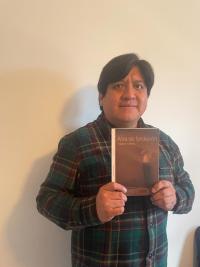
Victor Vimos, hailing from the small town of Riobamba, Ecuador, skillfully intertwines his life experiences and academic pursuits in his award-winning poetry book, Acta de fundación. Having obtained a bachelor's degree in Anthropology in Ecuador, he fostered a deep interest with the Andean region, particularly Peru, Ecuador, and Bolivia, which serves as a source of inspiration for his writing.
From Ecuador, he moved to Peru to pursue a master’s degree in Anthropology. While continuing to develop his academic skills, he cultivated his passion for writing, allowing his writing skills and interest to grow alongside his studies. “I chose the possibility of having an interdisciplinary context of research between anthropology and literature, and for that, I moved to the United States.” said Vimos.
Victor’s academic journey led him the University of Cincinnati where he received a second master’s degree in Latin American Literature and Spanish. To consolidate his interest between anthropology and literature, he applied to the Ohio State University where he is currently a PhD student in the Department of Spanish and Portuguese.
Weaving together his poetry and research, he creates a unique compilation that reflects both his personal experiences and academic interests. “In general, I am working on two sides. The first side is poetry. I am working on writing in different levels of interest. The other side is working on my research with this kind of concentration in the Andean region, specifically in the relation between ritual theory and poetry.”
In general, the poetry book has two sides of exploration.
The first side being the relationship between sound and noise: sound like the cultural-official idea of memory, history and power and noise like the marginal idea of memory, history and power and the confronting of these two sides. “This book is originally dedicated to one indigenous leader from my hometown, Lazaro Condo. He was a very interesting indigenous leader in the struggles around the 70s and 80s in Chimborazo, Ecuador. This kind of character, Lazaro Condo, to me has in general this kind of contrast between sound and noise, and contrast between official culture and questions of this kind of officialism.”
The second side of Acta de fundación is a relation with the language. Victor’s interest in the book is to explore how language matters when working with poetry. When he was in Ecuador and Peru, he was mainly a reader in their poetry traditions, but since living in the U.S., he has become a reader in American poetry traditions. “I have all of these kinds of elements and concentrations about the language and why the language matters in my research for the book.”
When asked about his interest in poetry, Victor expressed that poetry is a condensation of all of his interests in academic life and personal life. “My main view is that the anthropological field, the literature field, and now Latin America and cultural studies have a very strong and deep dialogue and interaction with my idea of poetry. I do not feel these sides of me are separate or splitting, but instead have grown up together.”
Acta de fundación is the culmination of ten years of work and has been written in all of the stages of Victor’s academic life. “While continuing to develop my research, in my personal life, I was a father, I was a bachelor, I was a master, so I translated this kind of experience to my poetry view and my poetry relation with the words and with the languages.”
In 2020, Acta de fundación was submitted for a Latin American poetry award called the Pedro Lastra International Poetry Prize, named after the famous and prolific poet from Chile. Victor Vimos was awarded the poetry prize by Aula de Poesía of Stony Brook University.
Most recently, Victor’s editor submitted the book for the Jorge Carrera Andrade National Poetry Award, the most famous poetry award in Ecuador. Victor was also awarded this prize for Acta de fundación. The Jorge Carrera Andrade award is only given out to one recipient every year. Based on the prestige of the award and the quality of his book, Victor was invited to present Acta de fundación at the Feria Internacional de Libro in Quito, Ecuador.
“In general, this kind of prize shows me that my work is doing well and is going in the right direction.”
Victor hopes to travel to other universities to have conversations about the book and talk about the approach between Latin American cultural studies and poetry. Through his studies, he has found the intersection between pursuing academic research and pursuing his personal interests in writing.
